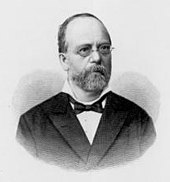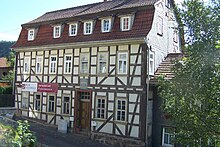Friedrich Lux (composer)
Adolph Friedrich Lux (born November 24, 1820 in Ruhla ; † July 9, 1895 in Mainz ) was a German composer , organist and conductor .
Career
Friedrich Lux's father, Georg Heinrich Lux (1779–1861), was a composer and organist. He gave his son his first music lessons, Friedrich Schneider was later a teacher in Dessau .
In 1841, Friedrich Lux received the position of music director at the Dessau court theater. In the City Theater of Mainz , he worked from 1851 as conductor. In 1864 Friedrich Lux became music director and conductor of the Mainz Liedertafel .
As a choirmaster in Mainz, he performed works such as Paulus , Messiah and the St. Matthew Passion . During his lifetime, Lux was considered one of the most important organ virtuosos in southwest Germany.
Works
Friedrich Lux wrote the romantic opera Der Schmied von Ruhla in Mainz, where it premiered in 1882. Further performances followed with great success on more than 30 stages, including Strasbourg , Chemnitz and Basel .
Other great works are the comic opera Die Fürstin von Athen (premiered in Mainz 1896) and Durch Nacht zum Licht , a symphony about Protestant chorales. Friedrich Lux also wrote a Missa brevis, festival overtures, numerous organ pieces, three string quartets and a piano trio as well as numerous choral works for different voices. After his death, Lux's music was gradually forgotten, but still found prominent advocates until the middle of the 20th century. The music researcher Wilhelm Altmann in particular campaigned for the composer and praised his chamber music in particular. More recently, there has been a renewed interest in the works of Friedrich Lux. The Lux Festival Association has been organizing series of concerts in its hometown of Ruhla and the Wartburg region in Thuringia since 2011 and the Lux Festival since 2013. The association also has a first version of an updated catalog of works. However, more detailed investigations into his work are still pending.
Incomplete list of works:
Works with opus number
- Opus 29 - Concert Fantasy on “ O sanctissima ” for organ
- Opus 32 - Romance from the opera "Casilda" by Ernst II. Duke of Saxe-Coburg-Gotha for organ
- Opus 33 - Concert piece on the prayer from Weber's Freischütz for organ
- Opus 52 - Concert Variations on a Theme (The Harmonious Blacksmith) by Handel for organ
- Opus 53 - Concert-Fantasy on Martin Luther's chorale “ Ein'fest Burg ” for organ
- Opus 55 - Great religious march for the opening of church celebrations for organ
- Opus 56 - Concert fugue for organ
- Opus 57 - Song without Words ( Canon ) for organ
- Opus 58 - Quartet for 2 violin, viola and cello (D minor)
- Opus 59 - Hymn: "Ertöne, celebrating song" for soprano solo, male choir and organ
- Opus 60 - Andante on the chorale melody " How beautifully shines the morning star " for organ and violoncello or horn
- Opus 61 - Concert piece for organ, 2 horns and 3 trombones
- Opus 63 - Sacred song without words for organ
- Opus 64 - Fantasie pastorale (concert piece) for organ
- Opus 72 - Missa brevis et solemnis, for solos and choir with accompaniment of orchestra and organ (harmonium)
- Opus 72a - Benedictus from Missa brevis et solemnis for soprano solo and eight-part female choir with accompaniment by organ or harmonium
- Opus 75 - Fantasy on Mozart 's consecration song " Brothers, reach out your hand to the bunch "
Works without opus number
- Canon in counter-movement about “ Honor God alone in the heights ” for organ
- Three chorale fantasies for use in church celebrations and in concerts for organ
- 1. Choral: God of heaven and earth
- 2. Chorale: Resurrect, yes resurrect
- 3. Chorale: Glory to God on high
- Fantasy on motifs from the opera “Das Kätchen von Heilbronn” by Reinthaler for organ (harmonium), pianoforte and violin or violoncello
- Paraphrase on the prayer from Weber's Freischütz for organ (harmonium), pianoforte and cello
Arrangements for organ
- Adagio by Louis Spohr
- Concert in D major by Handel
- Three pieces from Handel's “ Messiah ” in the form of a sonata
- Variations from Joseph Haydn 's Kaiserquartett
- March from the 1st suite opus 113 by Franz Lachner
- Introduction to the 3rd act of the " Mastersingers of Nuremberg " by Richard Wagner
- Meditation on Johann Sebastian Bach's 1st Prelude by Ch. Gounod for the organ alone
- Seventy selected organ pieces by Ch.H. Rinck adapted for organ without pedal (Harmonium) and fingering provided
Arrangements for organ with accompaniment of other instruments
- Andante from Beethoven's Sonata op. 14 no.2 for organ (harmonium), pianoforte and cello
- Benedictus from Beethoven's “ Missa solemnis ” for organ (harmonium), pianoforte and violin
- Request from L. von Beethoven for three male voices (2 tenors and 1 bass) with organ or harmonium accompaniment
- The Glory of God from Nature by L. von Beethoven for male choir with accompaniment by organ or wind instruments
- Hymn to the Virgin by Franz Schubert , for organ (harmonium), cello and harp (pianoforte)
- Songs by Franz Schubert for organ (harmonium), pianoforte and violoncello or violin
- Issue 1. By the sea
- Book 2. In Praise of Tears
- Book 3. Serenade
- Booklet 4. Spring faith , Heidenröslein , restless love
- Book 5. Lied der Mignon, Wasserflut , Frühlingssehnsucht
- Songs by Franz Schubert for organ (harmonium) and pianoforte
- Book 1. The Fisher Girl, On the Water, Secret
- Book 2. You are calm, Hunter's evening song, Ave Maria
- Sacrificial song by L. von Beethoven for four-part male choir accompanied by trumpets, horns and trombones or pianoforte or organ
- Prelude and quintet from the 3rd act of the " Meistersinger von Nürnberg " by R. Wagner , for organ (harmonium), pianoforte, violin and cello
literature
- Wilhelm Altmann : The chamber music works of Friedrich Lux . Diemer, Mainz 1920.
- August Reissmann: Friedrich Lux. His life and works . Breitkopf and Härtel, Leipzig 1888 ( urn : nbn: de: bsz: 15-0011-216457 ).
- Lux, Friedrich . In: Alfred Einstein (Ed.): Riemann Musiklexikon . 11th edition. tape 1 : A-L . Max Hesses Verlag, Berlin 1929, p. 1077 ( Textarchiv - Internet Archive ).
- Günter Wagner: Friedrich Lux (1820–1895). A forgotten Thuringian-Rhenish musician. In: Christoph-Hellmut Mahling (Ed.): Florilegium musicologicum. Hellmut Federhofer on his 75th birthday (= Mainz Studies in Musicology . Volume 21). H. Schneider, Tutzing 1988, ISBN 3-7952-0554-9 , pp. 445-462.
Web links
- Works by and about Friedrich Lux in the catalog of the German National Library
- Works by and about Friedrich Lux in the German Digital Library
- Kristina Krämer: Lux, (Adolph) Friedrich , music and musician on the Middle Rhine
- Biography of Friedrich Lux with a portrait
- Lux, Friedrich. Hessian biography. (As of January 30, 2020). In: Landesgeschichtliches Informationssystem Hessen (LAGIS).
- Sheet music and audio files by Friedrich Lux in the International Music Score Library Project
- Lux Festival Ruhla
Individual evidence
- ^ The curriculum vitae of Friedrich Lux on Klassika
- ^ Organ compositions by Friedrich Lux - advertisement in old music book, around 1900
| personal data | |
|---|---|
| SURNAME | Lux, Friedrich |
| ALTERNATIVE NAMES | Lux, Adolph Friedrich (full name) |
| BRIEF DESCRIPTION | German composer, organist and conductor |
| DATE OF BIRTH | November 24, 1820 |
| PLACE OF BIRTH | Ruhla |
| DATE OF DEATH | July 9, 1895 |
| Place of death | Mainz |

